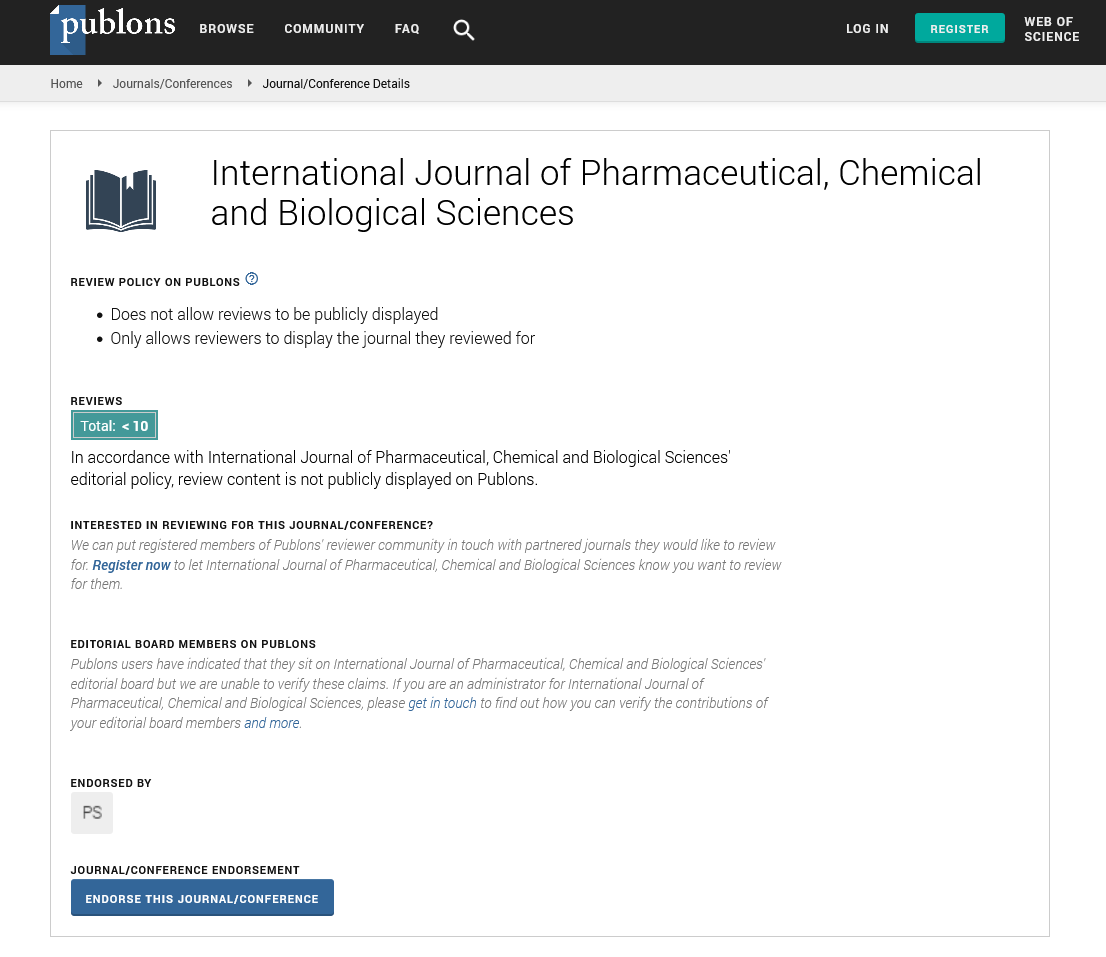Opinion - International Journal of Pharmaceutical, Chemical and Biological Sciences ( 2024) Volume 14, Issue 2
Unveiling the Dynamics of Pharmacodynamics: A Journey into Drug Action
Freya Williams*Freya Williams, Department of Pharmacy, Brown University, USA,
Received: 29-May-2024, Manuscript No. ijpcbs-24-140223; Editor assigned: 31-May-2024, Pre QC No. ijpcbs-24-140223 (PQ); Reviewed: 14-Jun-2024, QC No. ijpcbs-24-140223; Revised: 19-Jun-2024, Manuscript No. ijpcbs-24-140223 (R); Published: 26-Jun-2024, DOI: DOI: 10.36648/2471-9668-14.2.3
Introduction
In the ever-evolving landscape of medicine, where breakthroughs and innovations are the norm, the realm of pharmacodynamics stands as a cornerstone of understanding drug action. It is the intricate dance between a therapeutic agent and the human body, where molecular interactions shape the outcomes of treatment. As we delve into this captivating field, we unravel the profound implications it holds for modern healthcare. At its essence, pharmacodynamics encapsulates the study of how drugs exert their effects on the body, elucidating the relationship between drug concentration and response. It delves into the mechanisms by which molecules, be they synthetic compounds or natural substances, interact with biological targets to produce therapeutic or adverse effects. This nuanced interplay encompasses a myriad of factors, including drug-receptor interactions, signal transduction pathways, and ultimately, physiological and clinical outcomes.
Description
Pharmacodynamics extends beyond mere receptor binding, encompassing a broader spectrum of cellular and physiological processes. Signal transduction pathways, for instance, serve as intricate networks through which drug-induced signals propagate, regulating cellular function and gene expression. By deciphering these pathways, researchers can unravel novel therapeutic targets and develop interventions tailored to specific disease mechanisms. Furthermore, the dynamic nature of pharmacodynamics underscores the importance of dose-response relationships and pharmacokinetics. A drug’s efficacy and safety profile are not only influenced by its pharmacodynamic properties but also by factors such as absorption, distribution, metabolism, and excretion within the body. Achieving the optimal balance between these pharmacokinetic and pharmacodynamic parameters is essential for maximizing therapeutic benefit while minimizing the risk of adverse effects. In the era of personalized medicine, pharmacodynamics assumes even greater significance. The variability in drug response among individuals underscores the need for tailored treatment approaches based on genetic, physiological, and environmental factors. Pharmacogenomics, for example, explores how genetic variations impact drug metabolism and response, paving the way for precision medicine strategies that optimize therapeutic outcomes and minimize adverse reactions. Beyond its clinical implications, pharmacodynamics plays a pivotal role in drug discovery and development. By elucidating the mechanisms of action of novel compounds, researchers can identify promising candidates for further investigation and optimize their pharmacokinetic and pharmacodynamic properties through rational drug design. Moreover, pharmacodynamic modeling and simulation techniques enable researchers to predict drug behavior in vivo, streamlining the drug development process and accelerating the translation of scientific discoveries into clinical practice.
Conclusion
In conclusion, pharmacodynamics stands as a beacon of understanding in the vast sea of pharmacology, illuminating the intricate mechanisms by which drugs interact with the human body. From drugreceptor binding to signal transduction pathways, its principles underpin the development of novel therapeutics and the optimization of existing treatments. As we navigate the complexities of modern healthcare, a deeper understanding of pharmacodynamics promises to usher in a new era of precision medicine, where therapies are tailored to the individual and guided by the intricacies of drug action.
Acknowledgement
None.
Conflict Of Interest
None.

